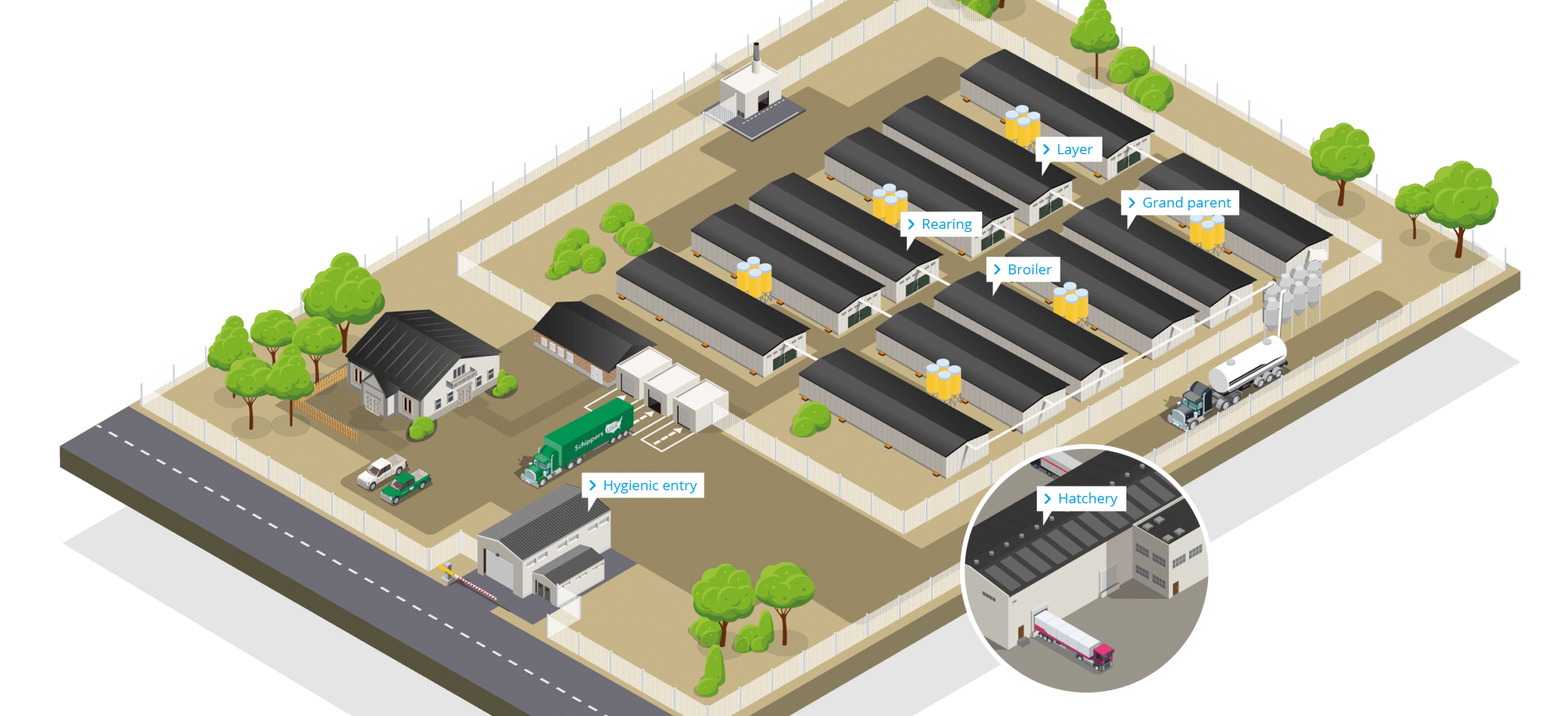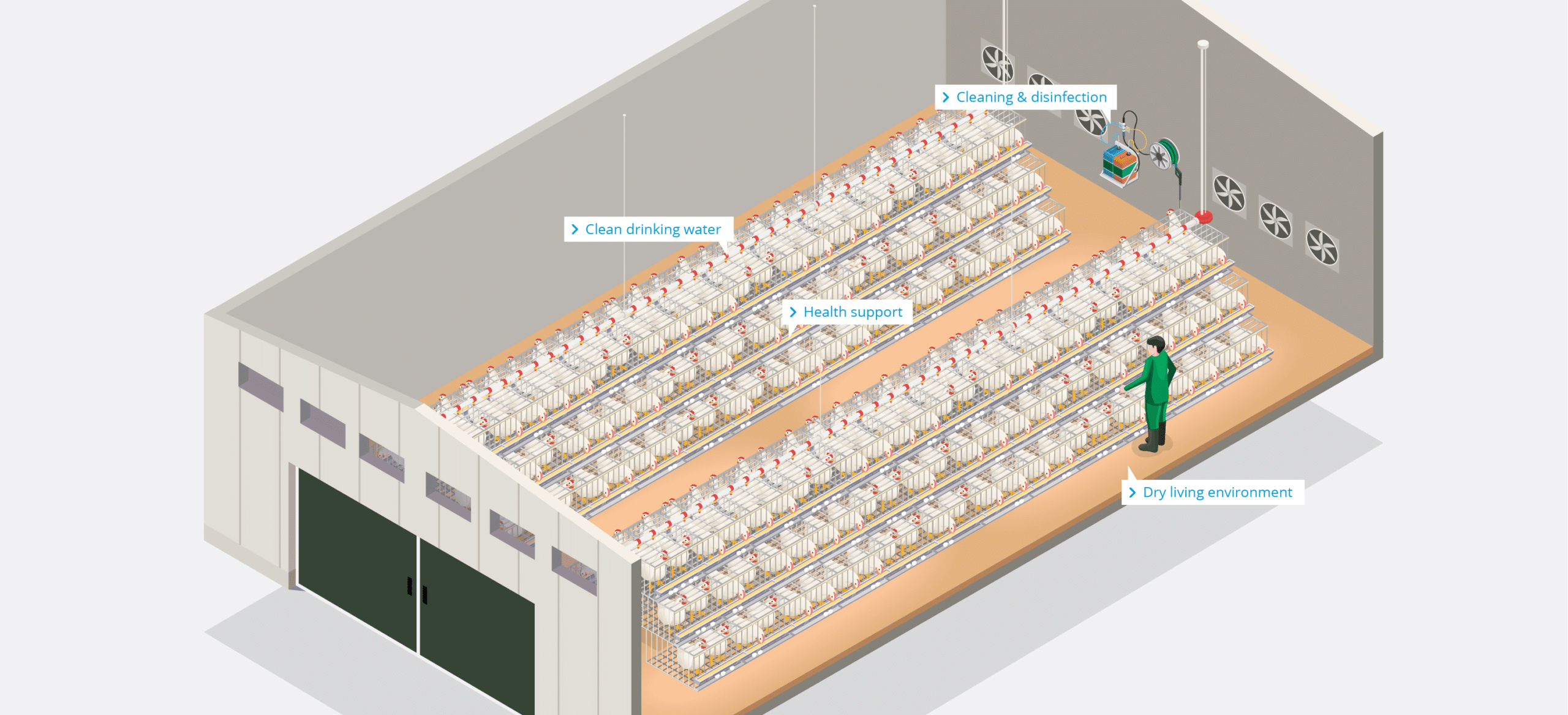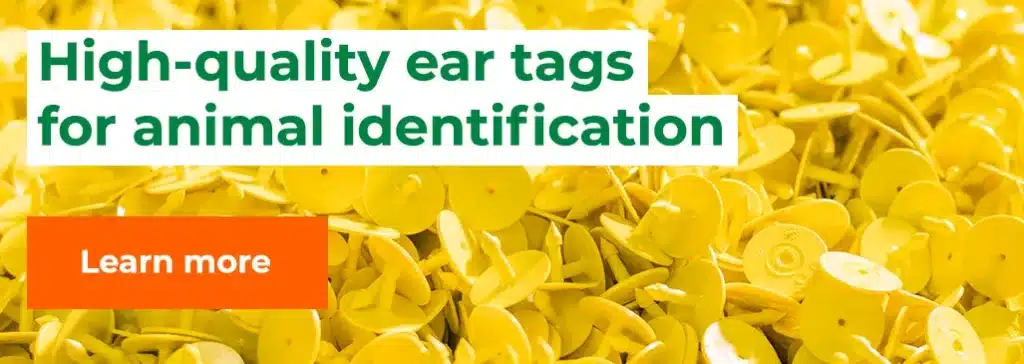
Hatchery
The hatchery is a specialized facility in the poultry industry where fertile eggs are incubated under controlled conditions to hatch into chicks.
Rearing
Rearing farms providing optimal conditions that promote the healthy growth and preparation of the young birds for their future roles as egg-laying hens or broilers.
Broiler
A broiler farm is dedicated to raising chickens specifically for meat production. The chickens in these farms are known as broilers. These farms focus on efficiently producing chickens that reach market weight within a relatively short period, typically around 5 to 7 weeks, depending on the desired size, market preferences and regulations.
Grand parent
A grandparent (GP) farm, also known as a grandparent stock farm, is a specialized facility in the poultry industry that is dedicated to breeding and producing the initial generation of breeding birds. These breeding birds serve as the foundation for the production of parent stock, which in turn produces the commercial broilers or layers that are raised for meat or egg production.
Layer
A layer farm is dedicated to raising hens specifically for egg production. In a layer farm, the primary focus is on maximizing egg production while maintaining the health and well-being of the laying hens. These hens are referred to as "layers" because they are raised primarily to lay eggs that are collected for human consumption.
Hygienic entry
The hygienic entry area at a poultry farm refers to a controlled and designated zone where individuals, including farm workers, visitors, and service providers, must adhere to specific hygiene protocols before entering the main production area of the farm.
Biosecurity programsfor poultry farms
Grand Parent (GP)
What’s important at the GP farm?
A GP farm aims to produce healthy, genetically superior birds that exhibit desirable traits such as growth rate, feed efficiency, disease resistance, and egg production. Some key performance influencers are:
Genetics selection
- Choose superior breeding lines with the desired traits for the specific poultry market. Genetic selection plays a vital role in determining the performance potential of the offspring.
Biosecurity
- Implement stringent biosecurity measures to prevent the introduction and spread of diseases. The health of GP birds is crucial to ensuring the quality of the parent stock.
Housing and environment
- Provide clean, well-ventilated housing with controlled temperature and lighting conditions.
- Ensure appropriate stocking density to prevent overcrowding and stress.
Nutrition
- Develop a well-balanced, nutritionally appropriate diet supporting optimal growth, reproductive performance, and egg quality.
- Utilize feed formulations tailored to the specific nutritional requirements of GP birds.
Achieving optimal performance at a GP poultry farm requires a holistic approach that encompasses genetics, health management, nutrition, and proper care throughout the birds’ entire lifecycle.

Common challenges
- Poor eggshell quality: Poor eggshell quality can result in poor hatchability and lower yield of healthy chicks
- Disease introduction: GP farms are at risk of disease introduction through contaminated equipment, vehicles, personnel, and other sources.
- Vertical transmission of disease: Many GP farms are part of vertically integrated poultry production systems. The interconnectedness increases the risk of disease transmission across the entire chain.
- Personnel movement: The movement of personnel between different farms can introduce diseases.
- Breeding-related problems, such as poor fertility or hatchability, can affect the quality of parent stock and, subsequently, commercial broiler or layer performance.
- Disease resistance: Exposure to stressors, poor management, and certain diseases can compromise immune function and make birds more susceptible to infections.
HyCare biosecurity programs inside GP farms

Cleaning and disinfection
A strict cleaning and disinfection program is paramount in creating an effective biosecurity program at GP farms. Optimizing the internal and external biosecurity programs with strict cleaning and disinfection protocols helps reduce the risk of cross-contamination. Disease introductions and vertical transmission between farms have devastating effects on the quality of the parent flock and the performance throughout the chain. Moreover, creating a low-pathogen environment at GP farms helps the birds reach their full genetic potential and boosts their reproductive performance.
Dry living environment
High moisture in the environment is linked to many health issues in poultry houses, including poor eggshell quality, respiratory diseases, increases in bacterial infections, coccidiosis, and many others. Consistently creating and maintaining a dry living environment is beneficial to eggshell quality and the health and performance of the GP flock.
Clean drinking water
Access to clean drinking water is crucial for optimal performance in grandparent (GP) poultry farms. Proper hydration aids digestion, nutrient absorption, and metabolic functions. It’s vital for egg production, temperature regulation, and immune system support. Regular water supply maintenance prevents disease transmission and ensures bird welfare.
The HyCare clean drinking water program ensures the availability of healthy drinking water at all times
Optimal care
Maintaining a balanced gut microbiota leads to improved digestion and nutrient absorption. Creating an environment in the bird’s gastrointestinal tract that discourages the growth of harmful bacteria and pathogens while promoting the growth of beneficial bacteria can be beneficial to the performance of the GP flock. The optimal care program focuses on the gut health of animals.
A strict cleaning and disinfection program is paramount in creating an effective biosecurity program at GP farms. Optimizing the internal and external biosecurity programs with strict cleaning and disinfection protocols helps reduce the risk of cross-contamination. Disease introductions and vertical transmission between farms have devastating effects on the quality of the parent flock and the performance throughout the chain. Moreover, creating a low-pathogen environment at GP farms helps the birds reach their full genetic potential and boosts their reproductive performance.
High moisture in the environment is linked to many health issues in poultry houses, including poor eggshell quality, respiratory diseases, increases in bacterial infections, coccidiosis, and many others. Consistently creating and maintaining a dry living environment is beneficial to eggshell quality and the health and performance of the GP flock.
Access to clean drinking water is crucial for optimal performance in grandparent (GP) poultry farms. Proper hydration aids digestion, nutrient absorption, and metabolic functions. It’s vital for egg production, temperature regulation, and immune system support. Regular water supply maintenance prevents disease transmission and ensures bird welfare.
The HyCare clean drinking water program ensures the availability of healthy drinking water at all times
Maintaining a balanced gut microbiota leads to improved digestion and nutrient absorption. Creating an environment in the bird’s gastrointestinal tract that discourages the growth of harmful bacteria and pathogens while promoting the growth of beneficial bacteria can be beneficial to the performance of the GP flock. The optimal care program focuses on the gut health of animals.

Contact us
Cuong Nguyen
Cuong Nguyen is our Technical Sales Manager and based in Ho Chi Minh City.
